The 10 Best Online Courses and Classes of 2022 – Intelligent
Online courses (sometimes called MOOCs, or Massive Open Online Courses) can be a great way to expand your skill set or explore an interest in a new subject. Most of the courses on our list don’t have any prerequisites, but more advanced topics may be intended for those with at least some experience of the subject matter. Online courses are an affordable way to access educational material from academic institutions and industry professionals while studying at your own pace. They’re especially useful for distance learners who aren’t located near a school that offers the material, and have been an important resource for those studying at home during the pandemic.
10 Best Online Courses
How We Chose the Best Online Courses
Online courses vary widely when it comes to the content offered, the length of the course, and the platform. We’ve taken reviews and enrollment levels into account to ensure that the courses we’ve included have been well-received by learners. We’ve also considered other factors such as the flexibility of the schedule and the time it takes to complete.
Popularity. Online courses have a broad reach. Some courses enroll over 1,000,000 learners. We’ve chosen courses that are popular on their respective platforms, and have been taken by at least several thousand learners.
Time to complete. Online courses range from brief tutorials to college-level courses that take several months to complete. We’ve focused on those that can be completed in a reasonable timeframe, usually several weeks to a month.
Flexible schedule. Most of the courses on our list have a flexible schedule so you can study at your own pace and don’t have to attend scheduled sessions. In most cases, you’ll have access to pre-recorded lectures, quizzes, and exercises.
Prerequisites required. Many online courses are open to learners of all levels, and don’t have any formal prerequisites. We’ve chosen courses with minimal prerequisites, but in some cases, such as programming courses, you may benefit from prior experience with the material.
Top 10 Online Course Providers

Intelligent Award: Most Interactive
Codecademy is known for “gamifying” the learning experience with interactive exercises and activities. This platform focuses on coding skills, so it’s a great place to learn about programming languages such as JavaScript, C++, and Python. They even have a quiz to help you figure out which courses are best for your career path and learning style. Codecademy is subscription-based, so you can access some content for free, but will need to subscribe to get unlimited mobile practice and certificates of completion.
Who should use Codecademy? Codecademy is suitable for learners of all levels who want to learn a new programming language from scratch or level up their existing skills.
Learn more
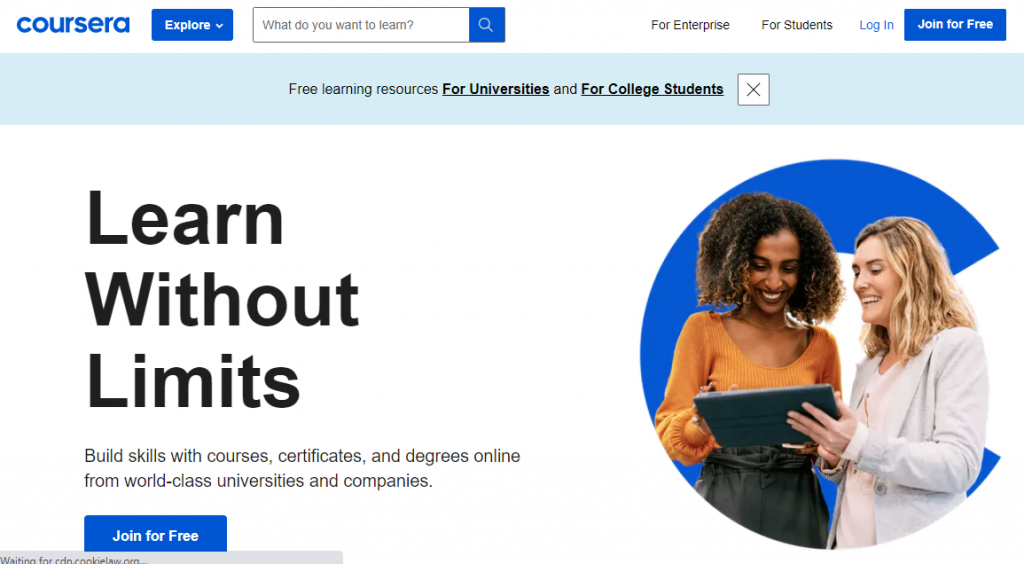
Intelligent Award: Best for Academic Outcomes
Coursera has partnered with over 200 universities and industry leaders, making this a good choice for learners who want a college-level curriculum. You can choose from a wide range of fields including IT, business, and the social sciences. Over one million people have enrolled in the Python for Everybody Specialization course, while others have earned a Google Professional Certificate to advance their career prospects. You can enroll in most courses for free, with the option to pay for a certificate of completion to share on your LinkedIn profile or resume.
Who should use Coursera? Coursera is best for learners who want to boost their academic credentials. Some courses come with the option to earn a formal certificate or degree.
Learn more
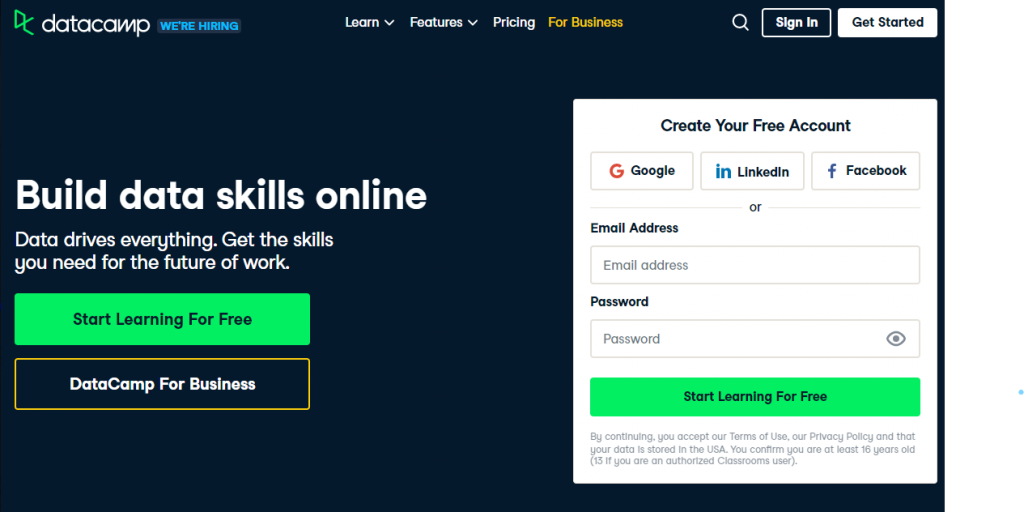
Intelligent Award: Best for Teams
DataCamp is available for individual learners, but it’s also a good choice for small teams and businesses because the Professional and Enterprise plans allow your entire team to learn as a group with access to hundreds of courses, projects, and challenges. DataCamp also offers free access for educators who use it to teach their students. This platform is entirely focused on data science, with courses on Python, machine learning, Power BI, and more. There are lessons available for all skill levels and you’ll earn XP along the way to keep you engaged in the material.
Who should use DataCamp? DataCamp is suitable for anyone who wants to learn about data science in a collaborative environment. Personal users get access to a community chat forum, while Professional accounts get an advanced administrative dashboard.
Learn more
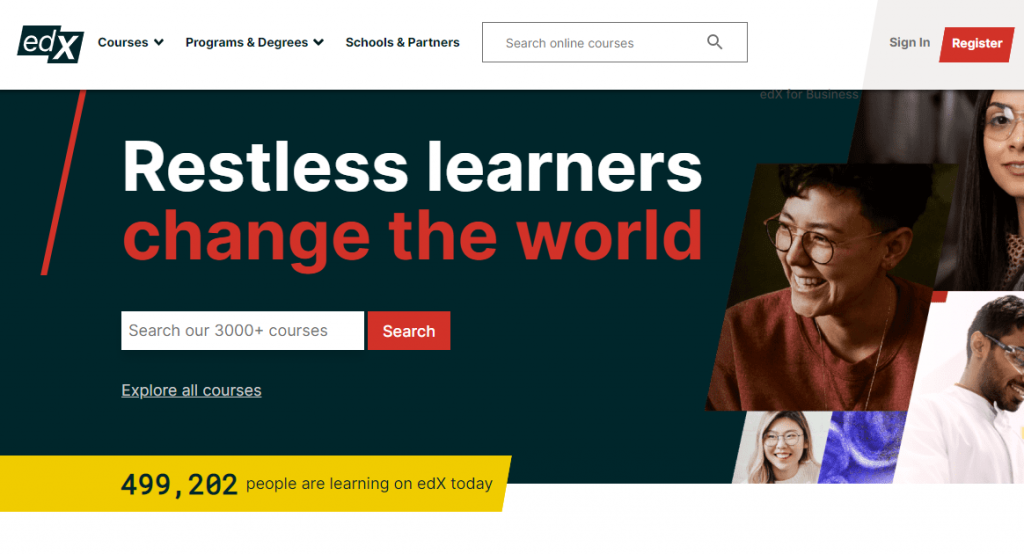
Intelligent Award: Most Interdisciplinary
While platforms like DataCamp and Codecademy are focused entirely on programming, edX offers hundreds of courses on a broad range of subjects. You’ll find everything from history to chemistry, backed by major universities like Harvard and MIT. Popular courses include “Tangible Things,” an introduction to museum studies, and “The Foundations of Happiness at Work.” Many courses are available for free, but you’ll need to pay in order to get a certificate of completion. Online Master’s degrees are also available.
Who should use edX? edX is a good option for interdisciplinary learners who want to explore a new subject — whether or not you want to get a formal certificate.
Learn more
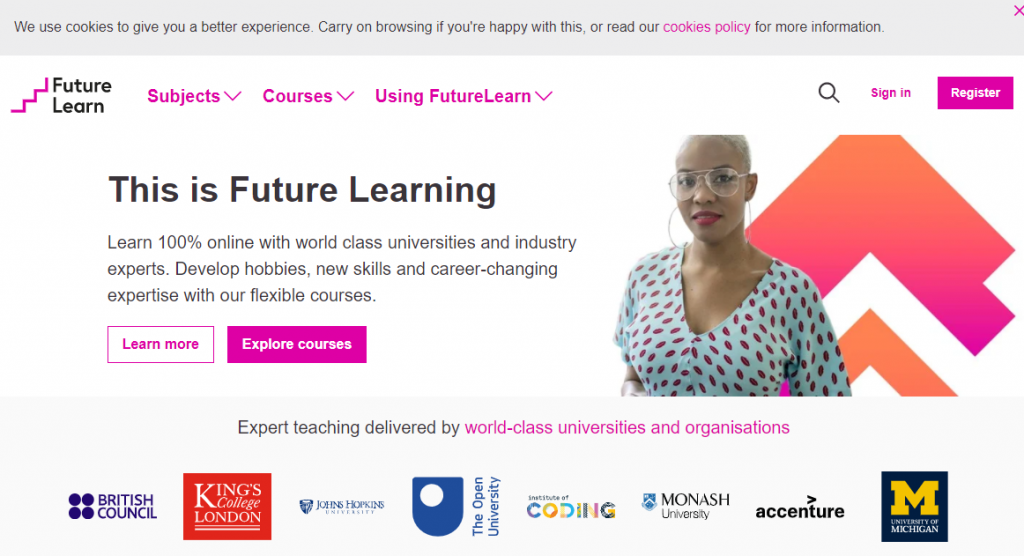
Intelligent Award: Best for Hobbyists
FutureLearn has partnered with major universities to offer “microcredential” programs that provide academic credit. But where it really stands out is its focus on hobbies and practical skills. You can learn how to run a social media campaign or try your hand as an author with the “Start Writing Fiction” course. Users can create a profile to interact with other learners, engage in discussions, and leave comments on course material. You can search for a course by subject matter, or follow an ExpertTrack to study a subject in depth.
Who should use FutureLearn? FutureLearn is great for those who want to learn a new skill or explore a new hobby, while interacting with other learners and instructors.
Learn more
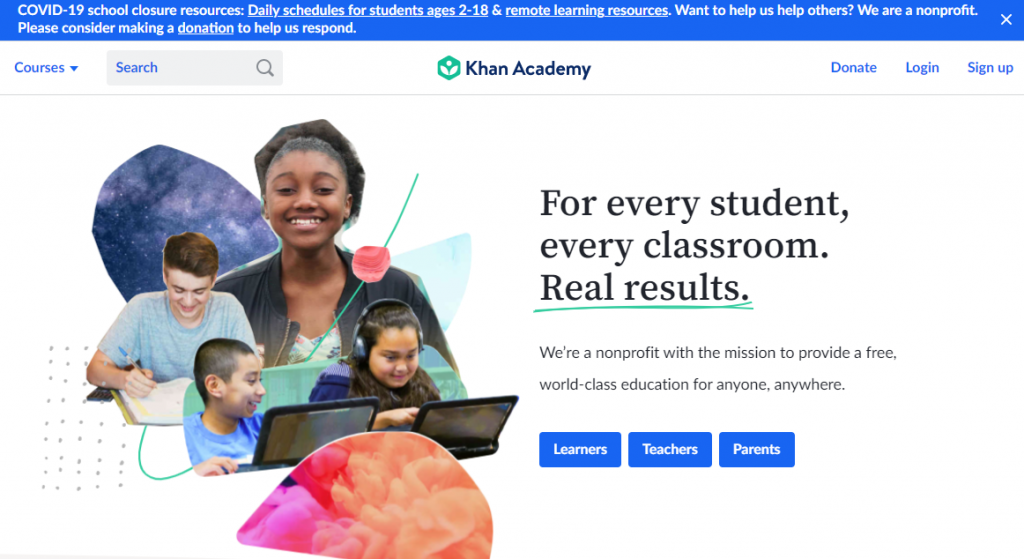
Intelligent Award: Best for All Ages
Most of the platforms on our list are aimed at college-level students, but Khan Academy offers courses for all grade levels from kindergarten to college. You’ll find courses on high school algebra and geometry, as well as test prep courses for the SAT, LSAT, and more. Khan Academy also offers courses on creative thinking and life skills, including an “Introduction to Storytelling” and tips on money mangement. Khan Academy is a non-profit and all of the course material is available for free.
Who should use Khan Academy? Khan Academy is ideal for grade school, high school, and college students, offering comprehensive coverage of math, science, and language arts.
Learn more
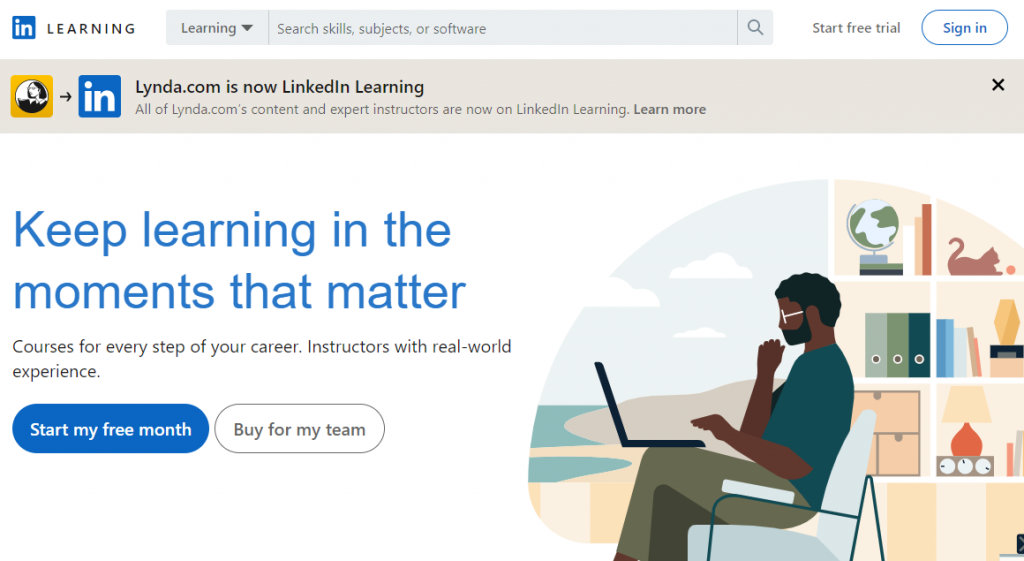
Intelligent Award: Best for Professional Outcomes
LinkedIn Learning offers courses in three broad categories: business, technology, and creative, with a focus on professional advancement. Business courses include topics such as “How to Develop Your Career Plan,” while creative courses focus on graphic design, web design, video editing, and other professional skills. LinkedIn Learning is available for both individual and business subscribers, with 16,000+ courses in its library. Users can get personalized learning recommendations and a certificate of completion to show on their LinkedIn profile.
Who should use LinkedIn Learning? LinkedIn Learning is a good fit for professionals who want to improve their skills in a specific area and add new credentials to their resume.
Learn more
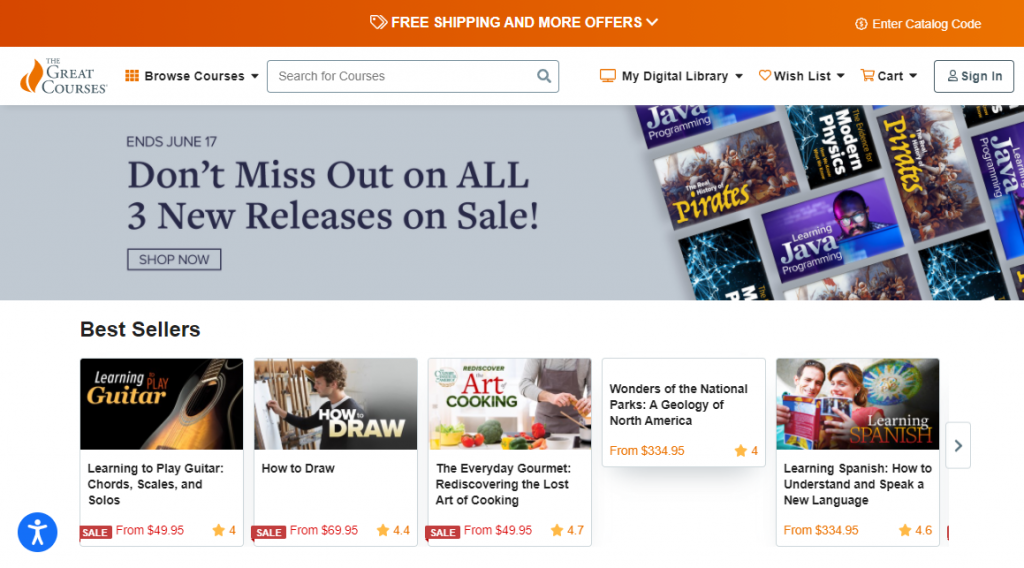
Intelligent Award: Best for Lifelong Learners
The Great Courses takes an expansive view of education, with courses on practical skills such as drawing, cooking, and playing guitar, as well as scientific, cultural, and historical topics. Partners include the Smithsonian, National Geographic, and the Culinary Institute of America, making The Great Courses a good choice for lifelong learners and curious intellectuals. Popular categories include food and wine, philosophy and religion, and economics and finance. Courses are accessible on iOS, Android, Roku, and other mobile devices.
Who should use The Great Courses? This platform is a good fit for learners who want to broaden their perspective on the world without the pressure of tests and homework.
Learn more

Intelligent Award: Best for Advanced Skills
Udacity’s courses focus on the latest high-tech skillsets, such as an “AI Programming with Python” and “Introduction to Self-Driving Cars.” While some courses are suitable for beginners, others have prerequisites such as previous programming experience. Udacity is known for its “nanodegrees,” which take several months to complete, and may be recognized as a professional credential by industry leaders. Udacity courses feature hands-on, project-based content, and you can study at your own pace with access to 24/7 support if you need help.
Who should use Udacity? Udacity is best for IT professionals who want to dive deep into a specific programming niche, such as self-driving cars or robotics.
Learn more
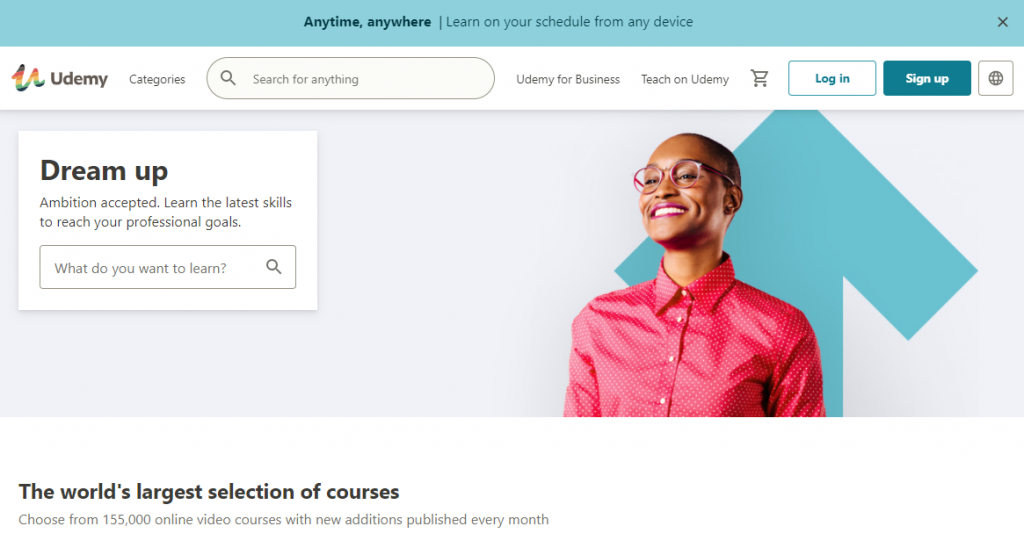
Intelligent Award: Best for Personal Development
Udemy covers some of the same topics as other platforms on our list, such as Python programming and data science. But it also has a broad catalog of personal development programs, including “Productivity and Time Management for the Overwhelmed” and a Cognitive Behavioral Therapy (CBT) Practitioner Certificate. Most courses are taught by industry professionals who have first-hand experience in the field. Udemy courses are short and affordably-priced, and come with a 30-day money-back guarantee.
Who should use Udemy? Udemy is great for those who want to learn directly from the experts, with courses that can usually be completed in a matter of hours or days.
Learn more
Student Resources
What can you expect from an online course
Online courses vary widely in terms of length and cost, so it’s important to make sure that the course you choose will suit your learning style and budget. You may be able to receive college credit or a professional certificate after you finish the course, but that’s not always the case, so it’s a good idea to confirm this in advance.
Some courses include a university-level syllabus, while others are more “gamified,” and feature interactive exercises and quizzes to keep you engaged. Most online courses are delivered in the form of pre-recorded video lectures, but some offer a community forum where learners can engage with other classmates and with the instructor.
Tips to succeed in an online course
1. Consider the cost
First, consider how much you’re willing to spend on an online course. A beginner course may cost as little as $10-20, while an advanced “nanodegree” can cost over $1000. The majority of courses will fall somewhere in the middle. In many cases, you can enroll for free and pay $100-200 for a formal certificate of completion. Some platforms operate on a subscription basis, while others let you pay in monthly installments.
It may also be worth finding out if your employer can cover the cost. Some pricing plans are specifically designed for business and enterprise users.
2. Get your tech squared away
Next, make sure you have all of the equipment you need. Many courses only require a computer that can play streaming video, but some advanced courses may require you to download specific programs and study materials. You can use a browser extension like the Video Speed Controller to play back videos more easily. Don’t forget to turn on subtitles if you need them, and find out whether a platform offers a mobile app so you can access content on the go!
3. Use the right study resources
Look over the syllabus before you enroll in a course and decide if you’ll need to buy any additional study materials. Some courses may include downloadable exercises and PDF resources you can use, but others may require specific textbooks. Doing some outside reading to brush up on the subject can’t hurt either!
4. Find a suitable study space
Most online courses don’t have live sessions, so you probably won’t be interacting with your instructor or other students via videoconference. That said, many platforms have a discussion forum where you can post comments, ask questions, or leave feedback on each other’s projects. If that’s not an option, ask a friend if you can share progress updates with them to keep yourself motivated while you work through the course.
5. Engage with other students
It can be hard to motivate yourself to study when you don’t get to spend time with your classmates face-to-face. Fortunately, many online course platforms provide options to engage with other learners, either in community forums or interactive projects. Some platforms also allow you to message the instructor directly or submit your work to be graded.
Don’t be afraid to ask questions, participate in discussions, and leave feedback on other students’ work if the course requires it. The more you interact with the content, the more likely you are to retain the material after you’ve finished the course.
Free versus paid online courses: What’s the difference?
The most common difference between free and paid courses is whether or not you get access to all of the learning material. Some platforms let you enroll in a course for free, but you’ll need to pay a fee in order to have your assignments graded or to receive a certificate of completion when you’re done.
Free courses aren’t necessarily lesser in quality than paid courses, but there may be limits to how much material you can access without upgrading.
